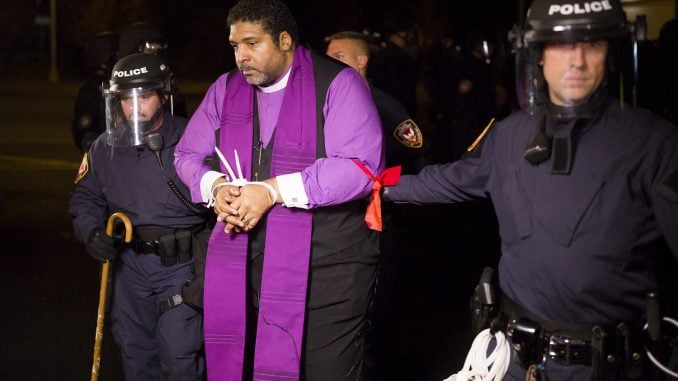
It’s only natural that activist organizations want to claim the moral authority and legacy of the American Civil Rights Movement. In many ways, that American movement carries with it a timeless model for civil disobedience and exacting change. Unfortunately, while possessing many good intentions, Moral Mondays and last Saturday’s Moral March in Raleigh make for a poor heir to that legacy.While some of Saturday’s posture and symbolism mirrors historical civil rights activism, it fell woefully short on substance. In his Raleigh address, Rev. William J. Barber II proclaimed that Moral Monday is akin to civil rights giants like the martyr Jonathan Daniels, or Fannie Lou Hamer and Rosa Parks. However, referring to a fellow Christian like the Rev. Franklin Graham as somebody who embodies “hate” and “heresy” is laughable.Civil disagreements on political aims or the role of God in the public square is fine, but falsely tagging a Christian as heretical because he does not support your partisan legislative agenda makes for an impoverished witness. Would Barber call the late great Rev. Fred Shuttlesworth, the hero of the Birmingham Civil Rights Movement, hateful or heretical for opposing same-sex marriage?Continuing to claim moral superiority by depicting the biblical narratives of deliverance with more government largess and programs only cheapens the true meaning of the Gospel’s timeless message. Calling other mainstream North Carolina politicians “racist” and “greedy extremists” for representing a different worldview only foments unhelpful division. It’s equally unhelpful to accuse Americans of wanting to replace Obamacare as doing so because they “despise a black president.” As Dr. Martin Luther King Jr. so beautifully noted: “Darkness cannot drive out darkness; only light can do that. Hate cannot drive out hate, only love can do that.”Barber, of course, quoted King on Saturday, but King was enormously successful because he was always trying to expand his aims to an increasing number of Americans. He continually drew from the deep well of America’s founders, the rule of law, and the dominant Protestant language to convince people of his ideas.In his famous 1963 “I Have a Dream” speech, King made no mention of contemporary figures, except for a reference to his children and the Alabama governor. The “I Have a Dream” speech and “Letter from Birmingham Jail” borrowed from many conservative ideas because he wished to convince the dominant white culture or those that opposed him to take his arguments seriously.Barber should be applauded for injecting moral arguments and biblical language into debates, but he should strive to reach beyond the simple-minded arguments of linking limited government and conservatism to racism. After all, the very notion of placing limits on governmental power is to expand the dignity of every human person, elevating him or her above the power of the state.Barber wants more North Carolinians to march with him and follow his big-government agenda. That’s fair enough, but he would be much more effective by curtailing the name-calling and harsh rhetorical stereotypes.
Ray Nothstine is a member of the North State Journal’s editorial board, separate from the news staff. Unlike other newspapers, the North State Journal does not publish unsigned editorials; the author or authors of every editorial, letter, op-ed, and column is prominently displayed. To submit a letter or op-ed, see our submission guidelines.



